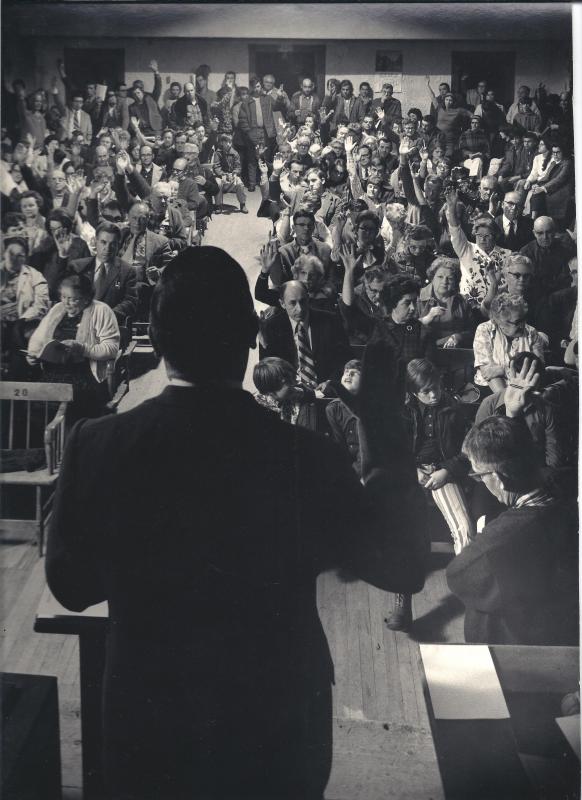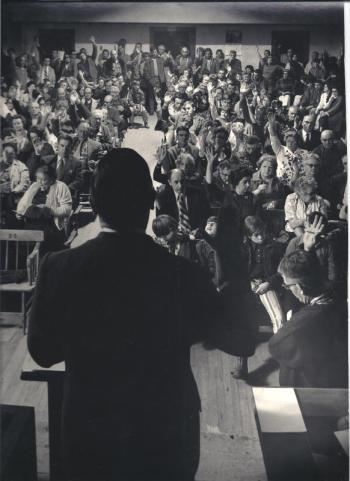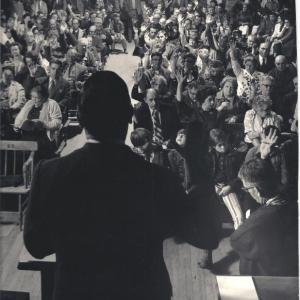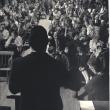This Week in Lincolnville: Asking for a Pause
It was bound to happen. In fact, it has happened. Our beautiful 39 square miles of hills and forests, of ponds and streams, of rocky shore, even including a tiny stretch of sand beach, is being discovered. But we’re not just a pretty face. We’ve got a good heart too with a reputation for strong community values.
Lincolnville has been attracting newcomers for centuries, starting with the first white settlers moving up from southern New England to what was then known as Magwintegwak or Choppy Waters to the people who’d gotten here first, the Wabanaki or People of the Dawn.
Those Knights and Youngs, Heals, Thomases and Millers, left the worn-out farms on Cape Cod and southern Massachusetts, land that had already been divvied up through inheritance until the current generation, the guys who’d fought in the Revolutionary War, couldn’t make a living.
Land was free in the district of Maine, which was still part of Massachusetts, or so these newcomers thought. Henry Knox, who’d inherited the Waldo Patent (with our 39 square miles smack in the middle) through his wife, Lucy Flucker, who’d inherited it through her grandfather, Samuel Waldo, had news for the hapless settlers. Waldo had gotten it through the beneficence of the King of England for who knows what favors he'd performed.
Just being rich and powerful probably.
Anyway, Henry Knox expected the settlers to pay him for the land they thought was their compensation for fighting for freedom. Mayhem ensued for a few years, including a tussel at Ducktrap over George Ulmer’s mill rights (he being Henry Knox’s man on the scene). Meanwhile, what did the Wabanakis, the Penobscot tribe of people who’d been living here for a thousand years, think?
Fast forward a hundred or so years from Nathan and Lydia Knight’s arrival in 1770, giving them the distinction of “first settler” and folks were already looking westward, packing up and moving out. The land had been cleared at great effort, the shorefront tamed with wharves and storehouses, the streams blocked with dams and mills.
Merchants set up business in the three villages – Beach, Ducktrap, and Center. Quarries and kilns provided some cash from lime and granite production, but the initial natural resource – the endless supply of lumber – had already been depleted. Old photographs show bare hillsides which today are thickly forested again.
CALENDAR
MONDAY, May 23
Board of Appeals, 4 p.m., Town Office
Broadband Committee, 5 p.m., Town Office Parking Lot
Harbor Committee, 6 p.m., Center Fire Station
Selectmen, 6 p.m., Town Office
TUESDAY, May 24
Library open, 3-6 p.m., 208 Main Street
Comprehensive Plan Review Committee and Selectmen workshop, 6 p.m., Town Office
WEDNESDAY, May 25
Library open, 2-5 p.m., 208 Main Street
Special Town Meeting/LCS Budget Meeting, 6 p.m., Walsh Common, LCS
THURSDAY, May 26
Soup Café, Noon, Community Building, 18 Searsmont Road
LIA meeting, 5:30 p.m., Tranquility Grange, 2171 Belfast Road
Broadband Committee, 6 p.m. Town Office Conference Room
EMS Performance Review Committee, 6:30 p.m., Town Office
FRIDAY, May 27
Library open, 9-noon, 208 Main Street
SATURDAY, May 28
Library open, 9-noon, 208 Main Street
EVERY WEEK
AA meetings, Tuesdays & Fridays at noon, Community Building
Lincolnville Community Library, For information call 706-3896.
Schoolhouse Museum by appointment, 505-5101 or 789-5987
Bayshore Baptist Church, Sunday School for all ages, 9:30 a.m., Worship Service at 11 a.m., Atlantic Highway
United Christian Church, Worship Service 9:30 a.m., 18 Searsmont Road or via Zoom
UPCOMING EVENTS
June 21: Eighth grade graduation
June 22: Last day of school
Post-Civil War years saw a great out-migration throughout New England. The soil had proven to be shallow, and thanks to the mile and a half thick glacier that had only recently (10,000 or so years before) receded, the tops of hills were left bald and the lowlands unbelievably rocky.
Letters came back from relatives who’d made the move to New York or Ohio or Illinois raving about the fertile, deep soil to be found there. One by one young folks left.
By the turn of the 20th century people were coming back up the coast, or to be accurate, Downeast from Boston. This time they had money in their pockets and were looking for the genteel “wilderness” of Lincolnville’s coast or ponds. Many of them were the sons and daughters of an old couple who’d stayed on the farm. As the years went by sometimes their children came back.
But it wasn’t to stay, not to weather a Maine winter, not to make a living. Some came to help the old folks on the farm, others to escape the heat of the city. Typically, the women came with the children, leaving Papa behind at work. He’d join them for a couple of weeks when he could, but by Labor Day they’d all gone back to the city.
The population of Lincolnville, which reached a high of 2,050 in the 1850 census, dropped to 811 in 1920. Abandoned farms, barns falling down, roofs collapsing were a common sight all over Maine. Lincolnville saw a brief flutter of prosperity, or at least stability, in the 1950s and 60s when Belfast called itself the Broiler Capital. Farmers took out loans to build the iconic long chicken barns to house tens of thousands of young birds, 8 weeks from day-old chicks to table-ready dinner, processed in the Belfast plants.
Wally and I arrived in 1970, just a few years behind Jean and Dick Brakewood, another family “from away” who found an old farm on Chester Dean Road to make their home. The attraction for us was price, though admittedly we’d set our cap at $10,000; still, we were smitten at the way chickadees ate out of Nat Stone’s hand, at the trout brook (Frohock) down back, at the winding road through Sleepy Hollow, and paid $15,000 for the place. A check for $300 (all we had in our savings) was the downpayment and it was ours.
The rumor mill that summer had us as rich folks or maybe my father had bought it for us or possibly we were drug dealers.
The next decade saw more and more young couples, some with kids, moving to Maine. They called us hippies or back-to-the-landers or just “from away”. Some were here for only a few years, as the rigors of life in an often drafty, and certainly needy, old farmhouse or in an owner-built, Shelter Institute style house, possibly without modern amenities such as indoor toilet, running water, or even electricity broke up marriages and the resolve to live a simple life. Life has never been simple here. But then, it isn’t simple in the suburbs or the cities either.
Those that stayed figured out how to make a living here. How to make our houses liveable. We supported the many iterations of Lincolnville Central School from the four-room, four grade school it was in 1970 (grades 1-4 went to Hope, 5-8 to LCS, including Hope’s kids) through two major additons and the ultimate tear-down when it proved moldy, to today’s K-8 school and its excellent reputation in the area.
Along with Lincolnville’s natives, the folks who’d grown up here, and perhaps whose ancestors were among those early settlers, we’ve managed to come together as a town. We didn’t always agree on how to do things: it took years to get a kindergarten, more years to get a gym. We’ve argued about zoning, shoreland ordinances, policing, roads.
But we’ve also pulled an old schoolhouse across the road and turned it into a library; we’ve supported the accoutrements that have made LCS an excellent school – sports fields, gardens, and more. Currently, we’re restoring another old schoolhouse into the Historical Society’s permanent home. A town committee worked with MDOT to make the Beach an attractive spot along Atlantic Highway.
In 1970 the population was 934; today it’s 2,312. New houses, new roads, new people have populated our town in the past 50 years. The change has been gradual enough that it still feels much the same to me as it did when I first saw this house on a March morning after an early spring snowfall.
But the pressure of development is real. A plan to build a private pier a bit south of the Ferry is now in the works. The permanent structure would be 300 feet long with about another 80 feet of ramp and float or as an opponent of the project says, “as long as a football field, the end zone and into the stands”. The permanent structure will reach about 100 feet beyond the mean low tide line which is held in trust by the state for all people.
Wednesday night a special Town Meeting held at the school at 6 p.m. will consider a citizen petition to enact an “Moratorium ordinance that would prohibit the construction of any new or currently proposed piers, docks, floats, ramps, and other permanent structures along the coast in Lincolnville, for which construction has not yet commenced as of March 31, 2022”.
Any moratorium is by state law only in effect for 180 days giving townspeople time to either enact new ordinances on such a project or not. The petitioners say they are “asking for a pause to allow town officials, with input from residents, to formulate a means to adequately address development issues along the ocean shorefront which is currently undeveloped.”
Here are two views I read on the LBB this past week concerning the proposed moratorium:
“There will be a vote on Moratorium Ordinance that if passed will have an adverse effect on all Lincolnville property owners. There is some very unclear wording and even though the authors say that’s not what [they] intended when [they] wrote this! Interpretation of an ordinance should be crystal clear and land owners rights protected! Please consider voting NO on Moratorium at least till it can be worded correctly!”
And… “Ahh a clear summer’s night, the Milky Way floating over Pen Bay with a sparkling path to the rising moon. Sure it’s a lovely sight, but see it soon before 300 foot piers festoon the West side of the Bay and the glare of security lights robs us of dark skies needed to see the celestial wonders, like Bayonne New Jersey.”
Come out Wednesday evening and have a say about these development issues in our town. Government of, for and by the people.
Looking for Beach Gardeners
Lee Cronin writes:
“On Wednesday, May 25th a group of volunteer gardeners will be weeding, planting, watering and mulching gardens at the Beach. There are several individual plots where volunteers are needed. You choose whatever plants you want, plant them and water throughout the season. If interested, call me – 236-0028 –and I will meet you at the Beach where you can choose your garden. We receive many compliments on the flowers so we know they are enjoyed by the locals as well as tourists. Join us in making a difference!”
LIA Meeting
The first Lincolnville Improvement Association (LIA) meeting of the 2022 season will be held in the main room at Tranquility Grange this Thursday, May 26th at 5:30 pm. This will follow our usual format of a potluck supper followed by a very interesting speaker. We are excited to have Corelyn Senn talking the wharves and breakwater of Frohock Brook. Corelyn says "Frohock Brook, which runs between the Pub and the Pound, was once a busy harbor. There are enough remnants that we can create it again. It is so much fun to do!"
“Everyone is welcome! Please bring something to share for the potluck. Drinks will be provided. The LIA is delighted to be able to use Tranquility Grange for our May meeting while the Beach Schoolhouse is being restored, and to continue the long time spirit of community fostered at the Tranquility Grange. We hope to see you on Thursday!”
Memorial Day
The parade steps off from LCS on Hope Road at 1:30 p.m. Monday, May 30, ending at Veterans Park, next to the Library with a prayer, speech, wreath laying, rifle volley and Taps. Then, at 2:10 p.m. on Frohock Bridge at the Beach there will be a prayer, wreath laying, rifle volley and Taps.
Hope to see a good crowd at the parade and park. Memorial Day ceremonies symbolize the start of summer!
























